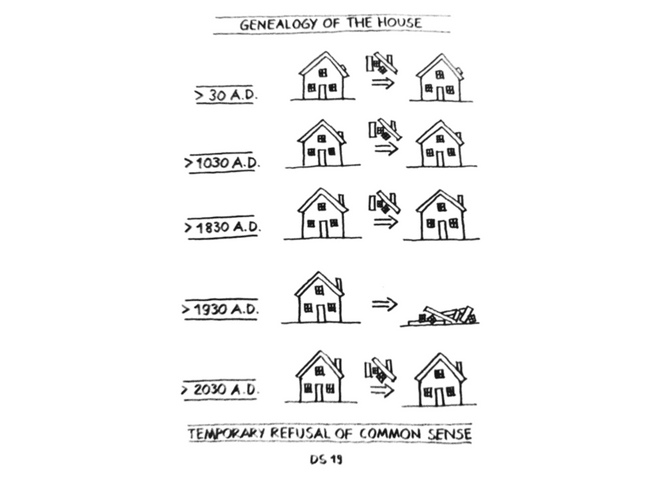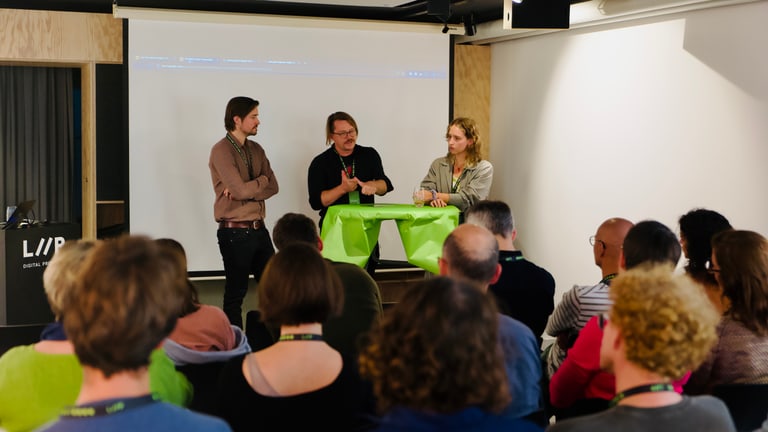In a world where environmental concerns are taking centre stage, Circular Economy has emerged as a beacon of hope for a sustainable future. More than a buzzword, some might argue that it is a transformative approach that reimagines how we produce, consume, and manage resources. But if we are being honest, and as one of our speakers, Laia Meier (Zirkular), working in bringing circularity in construction, put it, it’s actually returning to common sense after a phase of “temporary refusal of it” or as we can also put it, temporal worldwide insanity.
Simon Sigg presented initiatives in the city of Zürich, such as the collaboration with Project Restwert. It's all about finding a new home via Ricardo for perfectly good or even new and packaged items thrown away for incineration. Amongst other initiatives, they intend to use the SBB platform to enable city institutions that want to dispose of certain items, such as lamps and chairs, for example - offering them to institutions and offices that need them.
Laia Meier shared some shocking numbers with us: 84% of the waste in Switzerland comes from the construction industry. However, there is a way to change this. The newest addition to the job type that she holds is Material Hunter. This person goes to demolition sites and salvages what can be used in another construction. The process involves referencing in a database and matching with existing requests of new projects that are consulted for design with reuse.
The long-term aim is to eventually have all new constructions catalogued in a database, which can be used in the future when the building is carefully disassembled. Furthermore, she advocates for a shift in mindset and ambition, urging the construction industry to adopt practices of circular design that facilitate easy deconstruction and the reuse of various components, a little bit like Lego blocks.

We interviewed Matthias Wüthrich, Co-Lead of Circular Economy Switzerland and Senior Project Manager at ecos, to further dive into circular economy.
What does an evening like this inspire you?
Circular economy is really about getting out of your comfort zone. People are trying to collaborate. This cannot happen isolated in your room or your own company. So you really have to get out and find new allies that are facing problems but also have specific solutions. And by working together, you can overcome these barriers. This economy is really about a new mindset and new business models. In the end, it is about a new way of collaborating.
How can a company like Liip help?
This is a knowledge-intensive activity, and this data must be stored, transported and transmitted in one way or another. Digital platforms and consultancies have a huge role to play to facilitate and even accelerate the process. It is a key. Also, many things have to be aligned in order to track items. It represents a lot of data management.
A good example is in the construction sector. We need to have a database with information about all the materials built into an infrastructure so that these materials can be identified and re-used once the infrastructure has reached its end of life. For example, steel beams in a building that face demolition - these beams can be saved and re-used in a new building, which is more ecological and -considering all the external costs that come with the production of new beams-economic too.
Which aspects of the circular economy are important to understand?
Circular economy is a trending topic with a lot of confusion and misunderstanding. It is not just recycling, it is much more than that. Therefore, there are many strategies and related inspiring business models that come with it. For example, one is that you treat the products as a service, like renting lighting services instead of owning bulbs and lamps. Or in the sharing economy: instead of owning a car, you rent mobility via car-sharing platforms. Also, in construction, projects like Zircular or Circular Hub work this way. The faster companies apply circular economy principles, the greater their competitive advantages will be.
I think we have many good examples, many good ideas, but the breakthrough and the becoming mainstream are still processing.
Are you an optimistic person?
Well, yes and no, because I see the challenges, climate change, and biodiversity losses. These are huge issues, and it seems that we are not on track. Even the accurate measurement and assessment of circular economy is a highly complex issue. But circular economy strategies provide us with toolboxes to be able to overcome the problems and to reach essential goals. So, yes I am a realistic optimist. In the end, it is not a question of whether it is happening or not, rather a question of how fast it is happening.
One last question: what should we do first thing tomorrow morning?
Have tea instead of coffee, shower a little shorter or maybe a little colder, take your bicycle to work and challenge your CEO to transition into a truly circular economy.

